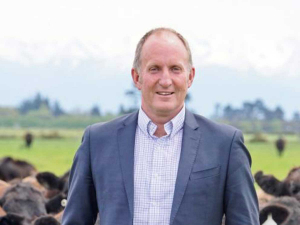Red Meat Exports Deliver $1.4bn in Tariff Savings Across EU, UK and US Quota Markets
Red meat exports to key quota markets enjoyed $1.4 billion in tariff savings in the 2024-25 financial year.
 BLNZ chair Andrew Morrison says the board stood by its decision to include the director fee resolution at the meeting despite it being rejected by farmers.
BLNZ chair Andrew Morrison says the board stood by its decision to include the director fee resolution at the meeting despite it being rejected by farmers.
A controversial move to increase the director fees was voted down by farmers at Beef + Lamb NZ’s annual meeting in Invercargill, last week.
As revealed in Rural News, on March 9, the resolution asking for a substantial increase in director fees for both directors of the Meat Board and Beef + Lamb NZ (BLNZ) had raised the ire of farmers. All BLNZ directors sit on both the Meat Board and BLNZ boards.
Levypayers were also concerned at the board’s sudden disestablishment of the Directors Independent Remuneration Committee (DIRC), set up in 2016 as an independent body to recommend any changes in director remuneration. The establishment of the DIRC was seen as a sound move and in line with how many other farmer-owned organisations operate – including Dairy NZ and Fonterra.
Chairman Andrew Morrison told Rural News the DIRC was disestablished primarily because both BLNZ and New Zealand Meat Board (NZMB) directors – basically the same people – agreed that the best approach in future was for the boards to actively take ownership of remuneration recommendations.
“The board has to make a final call on this, so we felt the extra layer [the DIRC] was adding complexity to a market-informed process.”
Rural News also uncovered that management consultants Mitchell Notley and Associates (MNA) had been hired by the BLNZ board to prepare a report on director remuneration. The MNA report suggested a substantial increase in Meat Board director fees and also a lift in BLNZ director payments.
This was then put forward in the board’s failed resolution at the annual meeting to substantially increase director payments.
In defending the proposed increase in director fees, Morrison said that farmers will ultimately have the final say on whether or not a controversial move to increase both BLNZ and NZMB director fees would go ahead. And farmers did reject the resolution – with 51.57% of levypayers who participated in the ballot, voting against any rise in the director fees. BLNZ says the proposed increase will now not go ahead.
“We stand by our decision to include the director fee resolution following the thorough review of NZMB’s director fees undertaken in 2020, which was independently reviewed by Mitchell Notley & Associates Ltd,” Morrison said in a statement.
“The final decision was always in the hands of voters and the ‘no’ vote shows we need to do more work to convey the increasing complexity of the NZMB’s role and the environment it operates in, and how this relates to director remuneration.”
The Meat Industry Association of New Zealand (MIA) today announced that Chief Executive Officer Sirma Karapeeva has resigned from the role.
The winners of the 2026 Hawke’s Bay/Wairarapa Dairy Industry Awards were announced at the annual awards dinner held at Copthorne Solway Park in Masterton on Thursday evening.
Environment Southland is welcoming this week’s decision by the Environmental Protection Authority (EPA) to approve the release of Blaptea elguetai, a leaf‑feeding beetle that will help control the highly invasive Chilean flame creeper.
This March, the potato industry is proudly celebrating International Women’s Day on 8 March alongside the International Year of the Woman Farmer, recognising the vital role women play across every part of the sector — from paddocks and packhouses to research, leadership, and innovation.
Fruit trader Seeka posted a record profit and returns to shareholders in 2025.
Recent weather events in the Bay of Plenty, Gisborne/Tairawhiti, and Canterbury have been declared a medium-scale adverse event.

OPINION: A mate of yours truly reckons rural Manawatu families are the latest to suffer under what he calls the…
OPINION: If old Winston Peters thinks building trade relations with new nations, such as India, isn't a necessary investment in…